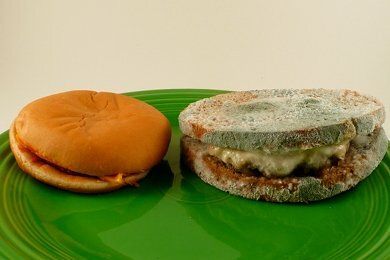Stanford University Scientist Comments On Burger Experiment
April 13, 2010 13 Comments
Last week's post on the rotting cheeseburger has created controversy here on Snack-Girl. If you didn't see it check it out here McDonald's Burger Left for Two Weeks.

The question remains, why didn't the McD's cheeseburger show signs of rot? I contacted McDonald's multiple times (including their VP of Corporate Relations), and Michael Pollan. I received an unsatisfying message from McD's, posted below. Michael Pollan was probably too busy to answer.
Many Snack-Girl commenters have given opinions on why the McDonald's cheeseburger didn't rot and the homemade burger did. Intuitively, we know that the McD's cheeseburger should show signs of decomposition after 11 days in a plastic bag at room temperature.
BUT, we also know with billions and billions served that a McD's cheeseburger isn't poisonous. We will live after eating a bunch of them - and some who commented eat a few a week and tell us that they are just fine.
So, what happened? The hypotheses posted on the site ranged from my kitchen being dirty (hey, I'm not going to argue about that - I'm not Martha Stewart) to ammonia in beef.
I was lucky enough to get a scientist to talk with me about the experiment. Justin L. Sonnenburg, Ph. D., is an Assistant Professor in the Department of Microbiology and Immunology at the Stanford University School of Medicine.
He studies gut microbes. Did you know that there are 10-100 trillion microbes that reside in our gastrointestinal tract representing thousands of species?
What does that mean? You are a walking bag of bacteria, fungi and other organisms. You have more microbial cells in your gut than cells in your body. Crazy, no? Those bacteria aid digestion of food along with stomach acids.
There is even a scientific journal called Gut Microbes. I know you all will be running out to get yourselves a copy after you read this :)
What did he think happened? From Dr. Sonnenburg:
I think it is possible that multiple factors contributed to the longevity of the commercial burger (e.g., nearly sterile starting material, preservatives, poor in nutrients required for growth of many microbes).
Why does it matter? From Dr. Sonnenburg:
Regardless, it is clear that many foods we eat, (whether they are processed, refrigerated, pasteurized, etc) have a much lower microbial burden than the foods with which our ancestors coevolved. In the case of preservatives and low nutrient content we consume 'food' that is not optimal for our health.
In other words, the McD's burger didn't have many microbes in it. A conclusion that McDonald's (see below) would agree with. It is counterintuitive to think that bacteria in food is a good thing. But it is! Obviously if we live with 100 Trillion bacteria and fungi, etc. in our gut, they are important to our health.
We know that some bacteria, such as certain strains of E. Coli, in our food can kill us. But, these instances are pretty rare and are (usually) the result of terrible food manufacturer practices.
E. Coli is a bad guy but there are many good guys. And when we distill the "life" out of our food we lose a major component in food that makes us healthy.
How can we get more microbes? From Dr. Sonnenburg:
Eating fermented foods (eg yogurt) is one potential way to supplement back some of these microbes that historically were consumed by our ancestors on rotten food; and indeed there are many health benefits ascribed to such probiotics. Unfortunately, the probiotic field has been plagued by poor science and research pursued by entities with a conflict of interest - but that is currently changing, so stay tuned.
So, eat some FAGE or other yogurt. Your tummy will thank you!
Want to read about snacks?
Love Ice Cream? Try This 130 Calorie Makeover
Have a Healthy Brownie! (a Mere 77 Calories)
Fastest, Easiest, and Tastiest Guacamole
Turn Cauliflower into YUMMYflower
Reply from McDonald's Corporation:
Thank you for contacting McDonald's. I appreciate this opportunity to share some information with you about our menu items.
We care about what you and your family eat. That's why we take great pride in the quality of our food. Since our first restaurant was built, we have purchased quality ingredients from trusted, industry-leading brands. We also carefully monitor our products, distribution and storage procedures; and use state-of-the-art computerized preparation methods in our restaurants. Not only do we meet government standards, but in many cases, we exceed them with our own strict quality control.
Every day, in every one of our restaurants around the world, our family promises to serve a quality meal every time to your family...we call it our quality promise. We don't think of quality as an extra ingredient that gets added on whenever it's called for. It's the main ingredient - an irreplaceable element in every recipe.
For further information on our top quality food items, please visit our web site at www.mcdonalds.com for food related inquires.
Again, thank you to taking the time to contact us and we look forward to serving you again soon under the Golden Arches.
Lisa
McDonald's Customer Response Center

13 Comments:
Ken Leebow
Danica
Ernst
Viola
@gfcfbayarea
Susan
MikeinAustin
Juliette
CoolKoon
MomLadyOR
Bridgette
Vivian Medina
Obbop